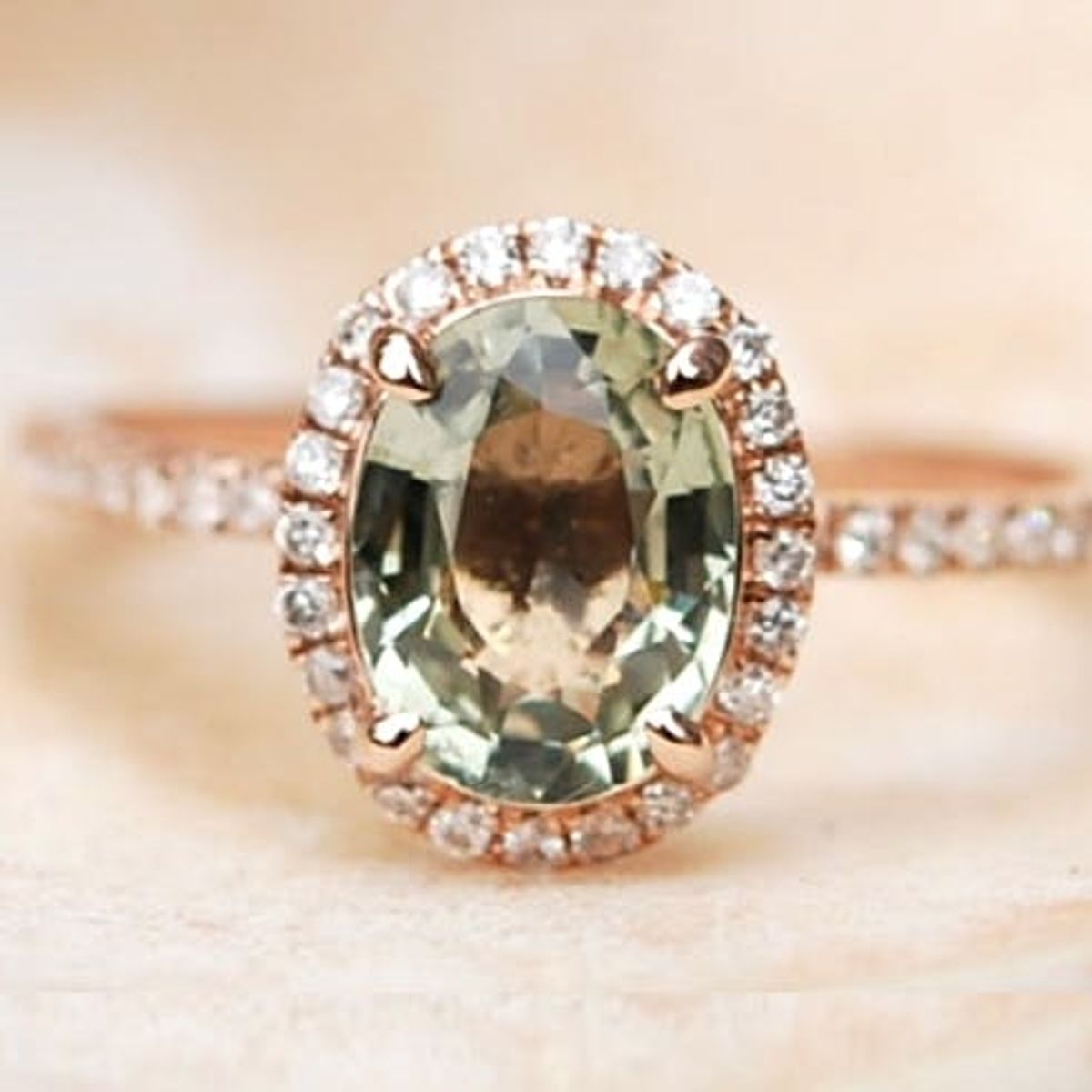15 Beautiful Sapphire Engagement Rings to Make You Say Bye to Diamonds

If you’ve browsed Pinterest or Etsy lately, you’ve probably noticed that sapphire engagement rings are crazy popular — and not just in blue. These days, you can find sapphire colors you didn’t even know existed, from frosty pink to tea green. “Light peach has been a big success for the last few years,” says the owner of Eidel Precious jewelry, who goes only by Eidel. “Now I [have] started to introduce light teal (blue green, close to aquamarine in color) and light jasmine green. Customers who are after a sapphire engagement ring want something different; they want to stand out.”
And stand out, they do — even in the celebrity sphere. The most famous sapphire is undoubtedly Kate Middleton’s iconic blue stone surrounded by diamonds, first worn by Princess Diana. And you can’t miss Jenny McCarthy’s sparkling yellow sapphire or Elizabeth Hurley’s square-cut blue version of the September birthstone.
You may be wondering if sapphires are built to last ’til death do us part. The answer is a resounding yes. On the Mohs Scale of Hardness (the standard used to measure the durability of gemstones), sapphires rank a nine compared with diamonds at 10. “Sapphire is the next natural stone close to diamond in durability and sparkle, but the price is much more affordable,” Eidel says. “People are attracted [to] the combination of variety of colors, brilliance, beauty and price.”
These magical sapphires will change your mind about that whole “diamonds are a girl’s best friend” thing.
1. Green Sapphire and Black Rhodium Ring ($2,750 for setting only): This vintage-inspired ring features a 14K yellow gold setting and black rhodium that perfectly complements the smokey green sapphire in the middle.
2. Padparadscha Sapphire Ring ($15,000): Padparadschas are among the rarest and priciest kind of sapphire, and resemble the pink-orange color of a lotus flower. What’s not to love about this 10.3-carat oval beauty?
3. Green Tea Sapphire Ring ($1,900): This light green sapphire is made all the more beautiful with diamonds surrounding it in a rose gold setting.
4. French Sapphire Diamond Platinum Engagement Ring ($6,999): Those who want an extra-unique ring will fall hard for this art deco design with a mix of diamonds and blue sapphires.
5. Champagne Peach Sapphire Ring ($2,500): Romantic brides will love this soft champagne peach sapphire with rose gold.
6. Sapphire and Diamond Band ($9,025): This sapphire and diamond band is the perfect pick for those who don’t like large center stones.
7. Cultured Blue Sapphire Ring ($1,970): This modern ring features a light blue cultured sapphire that gives it a raw, earthy look.
8. White Sapphire Engagement Ring ($1,490): The diamond halo surrounding this white sapphire makes for quite a stunner at a very affordable price.
9. Lavender Sapphire Solitaire Ring ($815): Don’t underestimate the simplistic beauty of this solitaire lavender sapphire in a rose gold setting.
10. Raw Uncut Pink Sapphire Ring ($195): Brides who want to swap a little sparkle for a modern design will love this raw hot pink sapphire.
11. Blue Green Sapphire Engagement Ring ($1,800): This pear-shaped, peacock-colored sapphire ring screams royalty.
12. Blue Sapphire Wedding Band Set ($640): The minimalist bride will love the subtle beauty of this blue sapphire band.
13. Sapphire Eternity Ring ($300): This blue sapphire ring against classic yellow gold is dainty and stackable.
14. Peach Sapphire Ring ($8,750): The 4.72-carat peach sapphire says it all. But the diamonds on the side don’t hurt, either.
15. Buttery Yellow Sapphire Ring ($2,999): Buttery yellow — even the description is amazing for this sapphire stunner set in platinum and flanked by diamonds.
Do you have (or want) a sapphire engagement ring? Let us know in the comments.
(Photo via Chris Jackson Staff/Getty)

















